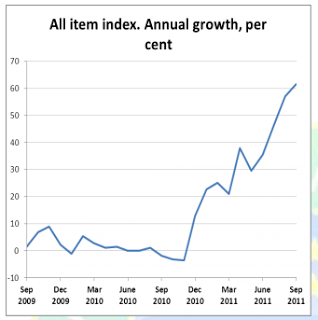South Sudan’s annual inflation now at 25%
By Julius N. Uma
January 18, 2012 (JUBA) South Sudan’s inflation fell to just 25% last month compared to the 41%, registered in the month of November 2012, the country’s National Bureau of Statistic (NBS) said it latest report.
 The decline in inflation, according to the state-owned body, resulted from a fall in food prices by 26% between December 2011 and 2012.
The decline in inflation, according to the state-owned body, resulted from a fall in food prices by 26% between December 2011 and 2012.
Prices for alcoholic beverages and tobacco, NBS said, increased by 54.1% over the same period the relevant figure for restaurants and hotels was an increase of 18.8%.
Land locked South Sudan, heavily relies on food imported from neighboring countries, due to its largely underdeveloped agricultural sector. Currently, only 4% of agricultural land in the country is reportedly utilised, yet the sector accounts for over 80% of rural household economies.
Early last year, however, the young nation shut down its oil production after a dispute with Sudan over transit fees, leaving its economy, which depended on oil, hinged on revenues from non-oil resources.
In May 2012, inflation in the young nation hit the 80% mark, with analysts attributing it to scarcity of fuel and hard currencies worsened by the north-south border impasse.
Meanwhile, South Sudan Consumer Price Index (CPI) reportedly decreased by 10.6% from November 2012 to December 2012, with the decrease mainly attributed to decline in food prices.
“The CPI decreased in Malakal [Upper Nile] by 14.7%, 12.8% in Juba [South Sudan capital] and increase by 1.5% in Wau [Western Bahr el Ghazal],” partly reads 7 January release from NBS.
On the other hand, consumer price inflation, reportedly increased by 26.1% in Malakal, 21.2%in Juba and 16.4% in Wau from December 2011 to December 2012.
The CPI, according to the statistical bureau, is an index, which tracks the price of a representative basket of goods and services consumed by households in South Sudan, with the composition of the goods and services in the basket reflects consumption of the average household in South Sudan.
However, the change in the CPI over time, it argues, indicates how much more expensive it is for the average household to continue consuming the same basket of goods and services.
(ST)
